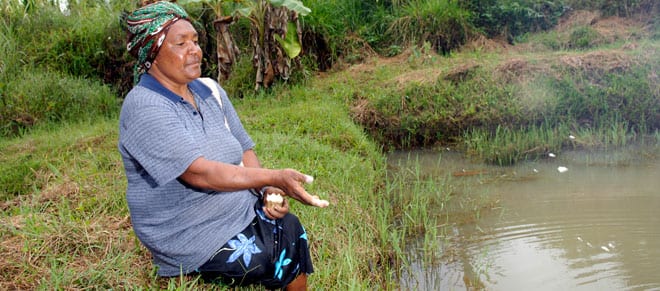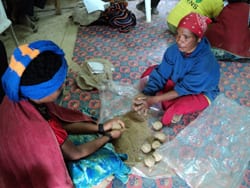This fishy business provides an income and source of food for families in PNG.

Oxfam and partner Hela Community Care are improving livelihoods in Tari through projects which are providing people with food security, health benefits and an income.
People in Tari don’t have a long history of fish eating and although they live on basic staples like cassava and taro, they have always had adventurous diets.
They started to develop an interest in fish with the influx of tinned varieties decades ago, and there has been a gradual increase in the demand for more of the fresh variety.
A sustainable income and better nutrition
To meet this need, HCC is setting up fish breeding centres in remote communities, with five fully operational.
They are running a training scheme to ensure that people can maintain their fish, keep them healthy, feed them and ultimately manage a readily available source of cheap, sustainable and nutritional food for their families.
The fish supplement people’s basic diets for half of the year, and they are also a means for people to generate their own income. The remainder of the year the fish are sold to other local people or exchanged for foodstuffs.
|
Hela Community Care is running a training scheme to ensure that people can maintain their fish and ultimately manage a readily available source of cheap, sustainable and nutritional food for their families. |
Operation
The fish ponds are dug into the ground and stocked with fingerlings (baby fish) provided by PNG’s National Fisheries Authority.
Oxfam is funding staff salaries and travel costs for people travelling to the workshops, whilst OilSearch, the local community affairs department of LNG, a gas company, has funded the ponds’ construction.
Difficult socio-political issues prevent the fish ponds from being run as cooperatives, but they are kept within families and farmers are keen to adopt the cooperative model as soon as conditions allow.
Feeds
At Koli farm, a scheme run by HCC in Tari, people keep livestock including rabbits, hens and fish. The animals and fish need balanced diets in order to produce meat and eggs.
HCC is working with the National Agricultural Research Institute to helping people produce their own sustainable animal feed. This means they can move away from a dependency on expensive imported feeds and use the savings for buying family essentials like clothing, medication or school resources.
 |
| Combining the ingredients into a ball, which will then be pushed through a grinder to produce pellets that are used to feed the fish kept in ponds. |
Fishmeal training
Fishmeal training sessions have been set up to encourage local fish keepers to use local ingredients to feed their fish, which are reared for food and selling in specially constructed ponds.
The sessions are overseen by a fisheries officer who teaches participants about which ingredients to use in their feed, (commonly rice bran, cassava, kumara and flour) and how to keep their fish healthy.
The ingredients are ground up and mixed together to create a paste, which is rolled into a small ball. This is then pushed through grinders, which are supplied by Oilsearch. The resultant pellets are then dried and ready to be used to feed fish.
The sessions are incredibly popular: at one session, 43 people turned up, including women who had spent two days trekking across mountainous terrain to get to the training. Some women were even moved to tears at the end of the session. They couldn’t believe they could make the feed themselves and save so much money.
Making their own pellets means people can save money on buying expensive, imported feeds. This money can be used to reinvest in their fish ponds or saved up to buy their children clothes, food and medicines.
Click on the images below to see more of the fish meal training sessions
 Oxfam Unwrapped in Papua New Guinea
Oxfam Unwrapped in Papua New Guinea
By buying a gift from Oxfam Unwrapped you can help support our livelihoods work in Papua New Guinea. Take a look at Oxfam Unwrapped’s gifts with a difference and help lift people out of poverty, for good.




